Iran’s Khuzestan Province Closes Borders Due To Omicron

Iran says it has closed all land and sea borders in the southwestern Khuzestan province to reduce the expected spread of the new Covid-19 variant, Omicron.

Iran says it has closed all land and sea borders in the southwestern Khuzestan province to reduce the expected spread of the new Covid-19 variant, Omicron.
Deputy Governor-General of Khuzestan, Valiollah Hayati, who oversees the provincial Covid taskforce, announced the restrictions on Saturday, saying the 15-day mandate starts immediately.
He then exempted holders of valid residence permits, student and work visas, students of seminaries and universities, as well investors and medical visas, adding that “only people from these seven groups” are allowed to cross the borders with their vaccine cards and a negative PCR test. Iraq borders Iran in the southwest.
Iran confirmed the first Omicron case on Sunday, December 19, and began preparations to deal with the new virus.
An official earlier in the week in Tehran said hospitals and clinics are on alert and are expanding emergency room services in anticipation of more infections with Omicron, noting that its impact will be felt next week.
Iran has reportedly vaccinated about 60 percent of its 84-million population with two doses of Covid vaccines, mainly the Chinese-made Sinopharm and the Russian Sputnik-V.
Although fatal cases have been decreasing during the past few weeks due to vaccination, a new study has indicated that Sinopharm and Sputnik vaccines are weaker against Omicron.
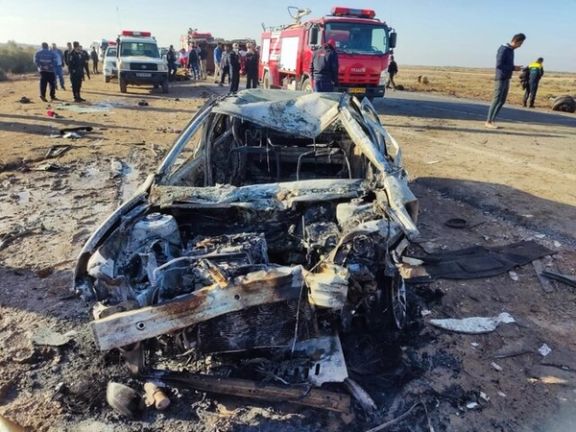
Ten people have died and more than a dozen injured Saturday in a multiple vehicle collision in Iran, which has one of the highets road fatalities in the world.
The deadly accident happened on Ahvaz-Khorramshahr highway in the southwest, when a truck crashed into a minibus and knocked it off its course, making it impossible for three cars to avoid hitting it.
According to the traffic police chief in Khizestan province, Reza Dolatshahi, the nine passengers of the bus, which was carrying workers of a local oil firm, and the driver of the truck, which was loaded with livestock, were the fatalities of the accident while two of the injured are in critical condition.
He added that about 440 people had lost their lives in road accidents in the province in first eight months of this year.
According to official figures, traffic accidents have claimed the lives of 8,644 Iranians from March to September, an increase of about 10 percent compared to the same period last year.
An earlier report by Iran’s traffic police said that nearly 280,000 have been killed and more than four million injured in car accidents in over a decade in the country. Iran ranks 8th highest country in road fatalities.
Substandrad vehicles and poor road condition are tha main reason for the high numbers.
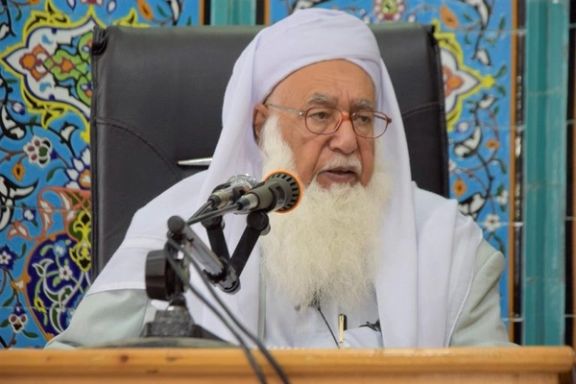
Hundreds of local Sunnis Friday joined the congregation of a Friday prayer leader who was sacked last week by the dominant Shiite clerical establishment in Iran.
Ayatollah Kazem Nourmofidi, representative of Iran in the northern Golestan province last week dismissed Gergij, the Friday prayer leader (imam) of Sunnis in Azadshahr. Nourmofidi also appointed a new imam for Azadshahr and nearby Galikosh which has a considerably large Sunni population and a Sunni seminary.
Both Shiite and Sunni Friday imams are appointed by the Supreme Leader or his representatives, but the imam's supporters say Shiite officials have no right to decide on their behalf, and their imams must be appointed by a council of Sunni clerics. Sunnis also oppose the interference of the Leader's representativesin running their seminaries.
Gergij's dismissal came after he made some remarks about Shiite Imams in his Friday sermon two weeks ago that some Shiites found offensive to their sanctities. Gergij said his remarks had been misinterpreted and he had meant no disrespect.
The sacking of Gergij has caused some unrest in Golestan province which has a large Turkmen and Balochi Sunni population. The Sunni imam's supporters have marched on the streets of Azadshahr and Galikosh several times since his dismissal by Khamenei's representative.
Gergij was summoned to the governor's office in Galikosh Thursday morning where hundreds gathered and chanted Allahu Akbar in his support. He was not allowed to return home before evening.
In a video distributed on social media Thursday, Gergij is seen reading from a prepared text and calling his supporters not to stage any protest rallies "to allow disputes to be resolved in a calm atmosphere". Some supporters have alleged that he was pressured to make the statement by security forces.
The Sunnis of Azadshahr were not allowed to hold their Friday prayers at the usual prayer groundsbut videos posted on social media Friday showed hundreds of local Sunnis gathered at a mosque in Galikosh where Gergij was led to the minbar (pulpit) to lead the prayers.
In a letter to Khamenei December 24, Abdolhamid Esmail-Zehi, the influential Sunni Friday imam of Zahedan in Sistan-Baluchistan province, said Gergij's dismissal troubled and disillusioned the Sunni population and could have "irreparable consequences for the unity of Shiite and Sunni Muslims in Iran.
Abdolhamid who is considered the most influential Sunni cleric in Iran has often criticized the Islamic Republic for treating the minority Muslim community as second-class citizens.
In the June presidential election, Abdolhamid who had in the previous elections supported reformist and moderate candidates threw his weight behind hardliner Ebrahim. But he put the onus on Raisi and said his government would be Iran’s “last hope".
The Sunni leader's pro-Taliban statementsafter the Taliban takeover in Kabul led to criticisms from rights groups.
Iran's Sunnis, who constitute between 5 and 10 percent of the population, often complain of discrimination, which bars them from key government and military positions.
Most Sunnis belong to Turkmen, Arab, Baluchi, and Kurdish ethnic groups who live in north-east, south-west, south-east, and north-west provinces respectively and may also be subject to ethnic discrimination.
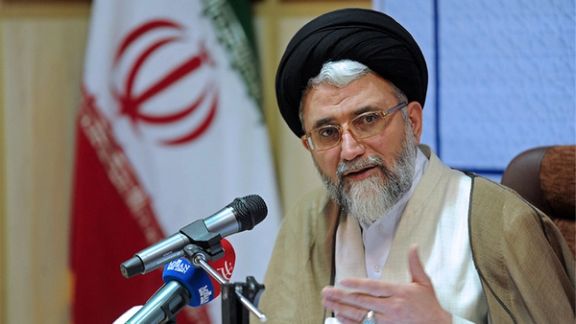
Iran’s intelligence minister Esmail Khatib says despite pressure by the United States and its allies Tehran currently has fewer problems in selling oil.
Iran’s oil exports have increased in the past one year compared with 2019-2020, according to business intelligence groups, but are still well below 2 million bpd exported before US sanctions were imposed in 2018.
Khatib also said that Iran’s access to its foreign currency reserves have also increased.
Iran does not officially announce the foreign currency reserves as a matter of policy and all figures are estimates calculated by international or foreign institutes. However, Iran’s currency has fallen by more than 20 percent since August, which is not an indication of access to foreign currencies.
In its regional report for the Middle East and Central Asia, the International Monetary Fund (IMF) has said Iran’s accessible international reserves was $4 billion in 2020, that is a tiny fraction of the $122.5 billion of reserves the country held in 2018.
In its latest Regional Economic Outlook, the IMF said Iran’s “oil activity will remain subdued in the short term, reflecting the OPEC+ production curbs and continued US sanctions.”
Islamic Republic has dipped into its foreign reserves to make up for the loss of oil revenues.
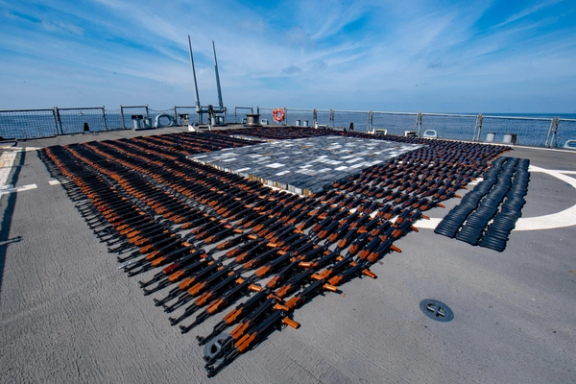
The United States said Thursday it will counter Iran’s threat to international and regional security, after an arms shipment to Yemen’s Houthis was seized by the US Navy.
"Iran’s support for armed groups throughout the region threatens international and regional security, our forces, our diplomatic personnel and citizens in the region, as well as our partners in the region and elsewhere," State Department spokesman Ned Price said in a statement, adding that the US is "committed to countering this threat from Iran".
According to Price, the US has seized dozens of anti-tank guided missiles, thousands of assault rifles, and hundreds of machine guns and rocket-propelled grenade launchers from similar vessels in both May and February of this year.
The United States Navy said Thursday that two of its patrol coastal ships seized a cargo of illicit weapons from a fishing vessel in the North Arabian Sea on Monday. The shipment, the Navy said, included upwards of 1,400 AK-47 assault rifles and 226,600 rounds of ammunition.
The vessel carrying the arms and ammunition originated in Iran, the US Navy said in its statement, adding that the ship was on a route historically used to illegally smuggle weapons to the Houthis in Yemen.
Direct or indirect supply, sale, or transfer of weapons to the Houthi rebels, who are fighting a Saudi-led coalition, is a violation of a UN Security Council arms embargo in force since 2015 and US sanctions. The Saudi-led coalition intervened in the Yemeni civil war in that year to back the country's internationally recognized government which appeared to be losing against the rebels.
Price also warned about the flow of weapons to Yemen saying it enables the Houthi offensive against the southern city of Marib and increases the suffering of civilians while stressing that both parties in the Yemen’s civil war -- the Houthi rebels and the internationally recognized government of President Abdrabbuh Mansur Hadi -- "must reach a political settlement together to end the war".
The war in Yemen is widely seen as a proxy conflict between regional and ideological rivals Saudi Arabia and Iran.
Houthi rebels who blame the Saudis of targeting civilians in rebel areas have also launched dozens of missile and drone attacks on Saudi Arabia in recent years including the attack on Saudi oil establishments in Abqaiq plant and Khurais in September 2019.
Saudi Arabia, the US and some Western countries directly blamed Iran for launching the attack, but Iran has always dismissed the allegations. Iran maintains that it only provides the Houthis with "political and advisory" support and has repeatedly accused the Saud-led coalition of war crimes in Yemen.
A panel of UN experts in a report in February 2020 said some of the new weapons used by the rebels since 2019 had "technical characteristics similar to arms manufactured in the Islamic Republic of Iran".
The UN report cited a weapons shipment seized off Yemen’s coast by the US Navy that included a cruise missile, an anti-ship missile and surface-to-air missiles, and concluded that the attack on Saudi Aramco oil facilities could not have originated in Yemen although the Houthis claimed responsibility for the strikes Tehran denied any involvement.
The earliest shipment of weapons which the US said it had seized from an Iranian vessel headed for Yemen, in 2013, consisted of Katyusha rockets, heat-seeking surface-to-air missiles, RPG-7s, Iranian-made night vision goggles, and artillery systems that track land and navy targets 40 km away.
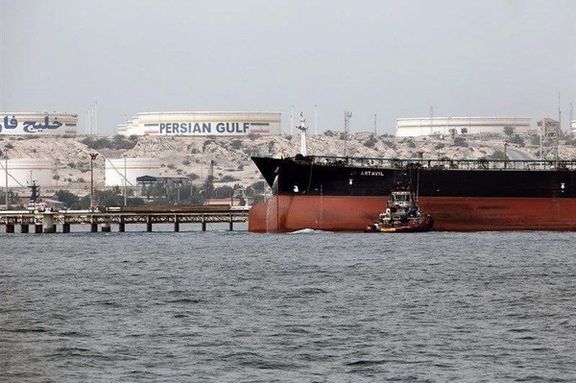
Iran has been able to boost oil exports to the extent that it has helped the economy grow by 3.3 percent this year, the government's news website said Friday.
The Islamic Republic News Agency, IRNA said that in the first six monthsof last Iranian year economic growth was 1.8 percent and because of more oil sales it reached 3.3 percent since March 21, when the new calendar year started.
The fact that Iran is selling more oil in 2021 has been reported by international oil trade and shipping monitoring firms, such as Kpler, that has said Iran this year is selling twice as much oil as in 2020.
Iran’s oil exports dropped from more than 2 million barrels per day in 2016-2017 to less than 200,000 in 2019, but started to grow in September 2020, before the US presidential election. No one can say with any certainty how much Tehran is exporting but estimates say volumes reach over 600,000 barrels per day.
Some have argued that this is because of less enforcement by the Biden Administration that has been indirectly negotiating with Iran since April trying to restore the 2015 nuclear agreement. The Administration denies it has been looking the other way, but somehow Tehran is shipping more oil primarily to China via middlemen and using illicit tactics.
China officially does not report any oil imports from Iran, because it is usually diverted through third countries and imported into China as originating from countries such as Malaysia, Iraq or the United Arab Emirates.
Over decades of various sanctions Iran has developed complex ways of circumvention and only diligent and determined pursuit can slow its illicit exports.
But the illicit methods also mean Iran sells the oil with a deep discount and middlemen also make hefty profits. Moreover, because of US banking sanctions Tehran often imports vital goods instead of receiving dollars for the oil.
The claim of 3.3 percent economic growth by IRNA cannot be independently verified and no details are mentioned in the report. In fact, other media in Iran, still under government censorship, sound dire warnings about the state of the economy, often through interviews with local experts and politicians who are currently out of power.
The national currency, rial, has fallen by more than 20 percentjust since August when President Ebrahim Raisi took office. This is indicative of a foreign currency shortage and the government’s reluctance to support the rial with limited reserves it controls.
The IRNA report is one of many other government claims, coming on daily basis, that that the Raisi Administration is hard at work and producing results, while except his hardliner supporters everyone else criticizes lack of progress in solving the economic crisis.